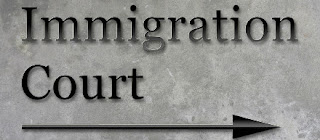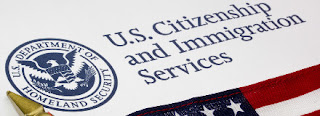INTRODUCTION
In this post, we will examine an exchange of letters between the Chief Justice of California (State courts), the Attorney General. and the Secretary of Homeland Security. The exchange regards reported immigration enforcement activities in California State courts. It highlights the myriad issues that are likely to arise as the administration of President Donald Trump pursues more aggressive immigration enforcement tactics, especially in local jurisdictions that decline to cooperate with Federal immigration enforcement.
LETTER FROM CHIEF JUSTICE OF CALIFORNIA TO ATTORNEY GENERAL SESSIONS AND SECRETARY KELLY
On March 16, 2017, the Chief Justice of California, Tani G. Cantil-Sakauye, published an open letter to Attorney General Jeff Sessions and the Secretary of Homeland Security John Kelly [
PDF version].
In the letter, Judge Cantil-Sakauye stated that she was “deeply concerned about reports from some of [California's] trial courts that Department of Homeland Security (DHS) agents appear to be stalking undocumented immigrants in our courthouses to make arrests.” She was referring to reports that agents from the DHS have been detaining in California State court buildings aliens deemed to be removable. She noted several concerns regarding the practice.
First, she explained that individuals in California turn to the courts to seek “justice and due process of the law.” To this effect, she took the position that immigration enforcement activities in California State courthouses undermined the confidence of individuals to seek justice in the California State court system.
Second, she suggested that federal immigration enforcement activities in California State courts implicated separation of power concerns.
Third and finally, she criticized the broader immigration policy of the Trump Administration, stating that “enforcement policies that include stalking courthouses and arresting undocumented immigrants, the vast majority of whom pose no risk to public safety, are neither safe nor fair” (emphasis added). Here, Judge Cantil-Sakauye offered a broader critique of immigration enforcement against those who she believes pose no threat to public safety.
In conclusion, she took the position that DHS enforcement activities in California State courts are unfair and impair the ability of California State courts to provide equal access to justice. She asked of both Attorney General Sessions and Secretary Kelly that they “refrain from this sort of enforcement in California's courthouses.”
RESPONSE FROM ATTORNEY GENERAL SESSIONS AND SECRETARY KELLY
On March 29, 2017, Attorney General Sessions and Secretary Kelly responded to the letter from Judge Cantil-Sakauye [
PDF version].[1] For reasons that we will see, they did not agree with her critiques of the current enforcement policies.
First, Sessions and Kelly described Judge Cantil-Sakauye's description of the enforcement activities as “stalking” to be “particularly troubling.” They wrote: “As you are aware, stalking has a specific legal meaning in American law, which describes criminal activity involving repetitive following or harassment of the victim with the intent to produce fear of harm.” After stating the definition, Sessions and Kelly asserted that the enforcement activities described by Judge Cantil-Sakauye in no way constitute “stalking,” citing to the Supreme Court decision in U.S. v. Watson, 423 U.S. 411 (1976) [
PDF version], and section 237 of the Immigration and Nationality Act (INA).
Next, Sessions and Kelly asserted that the United States Immigration and Customs Enforcement (ICE) only targets “specific persons who have been identified by ICE and other law enforcement agencies as subject to arrest for violations of federal law.” To this effect, they took the position that the ICE does not engage in so-called “'sweeps' or other indiscriminate arrest practices.”
Sessions and Kelly then noted that certain jurisdictions, including “the State of California and many of this largest counties and cities,” have adopted laws which are “designed to specifically prohibit or hinder ICE from enforcing immigration law by prohibiting communication with ICE, and denying requests by ICE officers and agents to enter prisons and jails to make arrests.” They argued that these policies “threaten public safety, rather than enhance it.”
Sessions and Kelly then drew a connection between the existence of laws intended to hinder cooperation with Federal immigration enforcement and the ICE's making arrests in California courthouses. They noted that, because of the lack of cooperation from many jurisdictions in California, ICE agents are required to “locate and arrest” certain removable aliens “in public places rather than in secure jail facilities.” They noted that, in light of this situation, it makes sense for the ICE to make arrests in courthouses, both because they can locate removable aliens and “[b]ecause courthouse visitors are typically screened upon entry to search for weapons and other contraband…”
In conclusion, Sessions and Kelly advised Judge Cantil-Sakauye to take her concerns to the Governor of California and to local officials “who have enacted policies that occasionally necessitate ICE officers and agents to make arrests at courthouses and other public places.” After defending the conduct of ICE officers and agents and again criticizing the policies of California and many of its jurisdictions, Sessions and Kelly stated that, while ICE agents “will remain mindful of concerns by the public and governmental stakeholders regarding enforcement activities, they will continue to take prudent and reasonable actions within their lawful authority to achieve their mission.”
ANALYSIS
The exchange of letters highlights the tension between many State and local jurisdictions and the Federal government regarding immigration enforcement. The tension is increasing because the Trump Administration is proving to be far less deferential to the preferences of local jurisdictions than was the Obama Administration, especially during then-President Obama's second term in office.
On one hand, local jurisdictions are not required to cooperate with Federal immigration enforcement. To that effect, California, and other states and localities, may choose to not cooperate with the DHS in matters pertaining to immigration enforcement.
However, the opposition of California or any other non-federal jurisdiction does not prohibit or preclude Federal immigration authorities from enforcing the immigration laws of the United States in those jurisdictions. Furthermore, the decision to not cooperate with or to outright hinder DHS enforcement activities does not necessarily come without consequences. Sessions and Kelly were honest in acknowledging that the ICE does make arrests in California statehouses and in connecting the locale of those arrests to the lack of cooperation they receive from California and its largest jurisdictions. Judge Cantil-Sakauye's disagreement with the ICE's policy has no more effect on the ICE's ability to enact that policy than the Department of Justice's (DOJ's) and DHS's disagreement with California policy has on California's ability to pass its own State and local laws. The same can be said of Judge Cantil-Sakauye's apparent opinion that the ICE should not enforce the immigration laws against those whom she deems to be not sufficiently dangerous.
This disagreement between California and the Trump Administration is one of the many we are likely to see over the coming months and years as certain States and localities adopt more aggressive “sanctuary city” policies in response to the Trump Administration's broader emphasis on immigration apprehensions and removals. To learn more about the issues, please see my post on the potential implications of Attorney General Sessions' move to strip funding from certain “sanctuary” jurisdictions, as well as legal issues.
Please visit the
nyc immigration lawyers website for further information. The Law Offices of Grinberg & Segal, PLLC focuses vast segment of its practice on immigration law. This steadfast dedication has resulted in thousands of immigrants throughout the United States.
- N.Y. Tmes. “Response From Sessions and Kelly to California's Chief Judge on Immigration.” nytimes.com. (Mar. 31, 2017) [Contributed by: News Documents, the New York Times].















